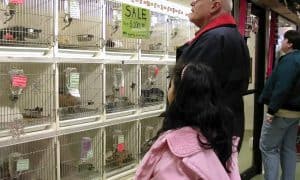“This post contains affiliate links, and I will be compensated if you make a purchase after clicking on my links.”
The Baltimore City Council will meet this evening to discuss and consider a citywide ban on the sale of puppies and kittens through retail stores.

Although Maryland state law already prohibits the sale of dogs and cats bred by illegal “puppy mills,” it does not ban the retail sale of animals bred at large-scale commercial breeding facilities which, many will argue, are merely federally inspected, legal puppy mill operations.
The Puppy Mill Project explains,
The standards governing the care of dogs and cats in commercial breeding facilities are set forth in the federal Animal Welfare Act (AWA). The United States Department of Agriculture (USDA) is the agency responsible for overseeing the commercial dog breeding industry and enforcing the AWA. Any breeder who wishes to sell to a pet store must be licensed with the USDA.
Retail pet store owners use the claim that their puppies and kittens are sourced from “USDA licensed and federally inspected breeders” to imply that these commercial breeding facilities are held to a higher standard of care. In truth, these breeders must only adhere to the very minimum standards set forth by the AWA – standards that are shockingly and horrifically low.
For example, the following are some of the minimum requirements of commercial breeders:
- There is no limit to the number of dogs on the premises. A commercial breeder could have hundreds or even thousands of dogs.
- There is no requirement on the number of staff that must be available to care for the dogs.
- Dogs may be kept in stacked cages.
- Mesh or wire flooring is allowed.
- Dogs may be forced to relieve themselves in their cages.
- Dogs may be confined in spaces only six inches larger than their bodies, not including the tail.
- A dog may be caged 24 hours a day for his or her entire life, only removed from the cage to be bred.
- There is no exercise requirement if dogs are housed with other dogs and certain minimal size requirements are met for the dog’s enclosure.
- Human interaction is not required.
- Breeding females at the first heat cycle and every heat cycle is permissible.
- Unwanted animals may be killed or auctioned off.
- Many of the AWA’s requirements are vague. The AWA leaves it up to the breeder to determine what is “adequate”.
If the ban proposed in Baltimore passes city council vote, it will only prohibit new retail puppy and kitten sales by pet stores as none are currently operating in the city.
Still supporters of the ban hope that it’s a step toward a similar ban state-wide that they hope to discuss during the state’s General Assembly sessions that begin this week.
If the city- or state-wide bans are adopted, retail stores will no longer be able to sell large-scale commercially bred cats and dogs. Consumers can still purchase puppies and kittens directly from breeders. Retail pet stores moving forward would only be allowed to adopt out dogs and cats available through registered rescue organizations like The Humane Society and local rescue groups.
Would you support a similar ban in your own city or state? Weigh in with a comment below!























